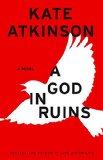Summary | Excerpt | Reviews | Beyond the Book | Readalikes | Genres & Themes | Author Bio

A Todd Family Novel
by Kate Atkinson
He shaded his eyes against the sun and scanned the skies for the skylark. It failed to make a reappearance and he had to make do with the aerial manoeuvres of the swallows. He thought of Icarus and wondered what he would have looked like from the ground. Quite big, he supposed. But Icarus was a myth, wasn't he? Teddy was going to boarding school after the summer holidays and he really must start getting his facts in order. "You will need to be a stoic, old chap," his father advised. "It will be a trial, that's the point of it really, I suppose. Best to keep your head below the parapet," he added. "Neither sink nor float, just sort of paddle about in the middle."
"All the men in the family" went to the school, his Hampstead grandmother said (his only grandmother, Sylvie's mother having died long ago), as if it were a law, written down in ancient times. Teddy supposed his own son would have to go there too, although this boy existed in a future that Teddy couldn't even begin to imagine. He didn't need to, of course, for in that future he had no sons, only a daughter, Viola, something which would be a sadness for him although he never spoke of it, certainly not to Viola, who would have been volubly affronted.
Teddy was taken aback when Izzie unexpectedly started to sing and— more startling— do a little dance. "Alouette, gentille alouette." He knew no French to speak of yet and thought she was singing not "gentille" but "jaunty," a word he rather liked. "Do you know that song?" she asked him.
"No."
"It's from the war. The French soldiers sang it." The fleeting shadow of something— sorrow, perhaps— passed across her features, but then just as suddenly she said gleefully, "The lyrics are quite horrible. All about plucking the poor swallow. Its eyes and feathers and legs and so on."
In that inconceivable yet inevitable war still to come— Teddy's war— Alouette was the name of 425 Squadron, the French Canadians. In February of '44, not long before his last flight, Teddy made an emergency landing at their base at Tholthorpe, two engines on fire, shot up as they crossed the Channel. The Quebecers gave his crew brandy, rough stuff that they were nonetheless grateful for. Their squadron badges showed a swallow above the motto Je te plumerai and he had thought about this day with Izzie. It was a memory that seemed to belong to someone else.
Izzie did a pirouette. "What larks!" she said, laughing. Was this, he wondered, what his father meant when he said Izzie was "ludicrously unstable"?
"Pardon me?"
"What larks," Izzie repeated. "Great Expectations. Haven't you read it?" For a surprising moment she sounded like his mother. "But, of course, I was making a joke. Because there isn't one any longer. The lark, I mean. Flown orf. Gorn," she said in a silly cockney accent. "I've eaten lark," she added in an offhand way. "In Italy. They're considered a delicacy over there. There's not much eating on a lark, of course. No more than a mouthful really."
Teddy shuddered. The idea of the sublime little bird being plucked from the sky, of its exquisite song being interrupted in full flight, was horrible to him. Many, many years later, in the early Seventies, Viola discovered Emily Dickinson in an American Studies course that was part of her degree. In her scrawly, untamed hand she copied down the first verse of a poem she thought her father would like (too lazy to transcribe the whole of the short poem). "Split the Lark — and you'll find the Music, Bulb after Bulb, in Silver rolled." He was surprised she had thought of him. She rarely did. He supposed literature was one of the few things they held in common even though they rarely, if ever, discussed it. He considered sending her something in return— a poem, even a few choice lines— as a means of communicating with her. "Hail to thee, blithe spirit! Bird thou never wert" or "Hark, how the cheerful birds do chaunt their lays, and carol of love's praise" or "Ethereal Minstrel! Pilgrim of the sky! Dost thou despise the earth where cares abound?" (Was there a poet who hadn't written about skylarks?) He supposed his daughter would think he was patronizing her in some way. She had an aversion to learning anything from him, possibly from anyone, and so in the end he simply wrote back, "Thank you, very thoughtful of you."
Excerpted from the book A God in Ruins by Kate Atkinson. Copyright © 2015 by Kate Atkinson. Reprinted with permission of Little, Brown and Company.
Your guide toexceptional books
BookBrowse seeks out and recommends the best in contemporary fiction and nonfiction—books that not only engage and entertain but also deepen our understanding of ourselves and the world around us.